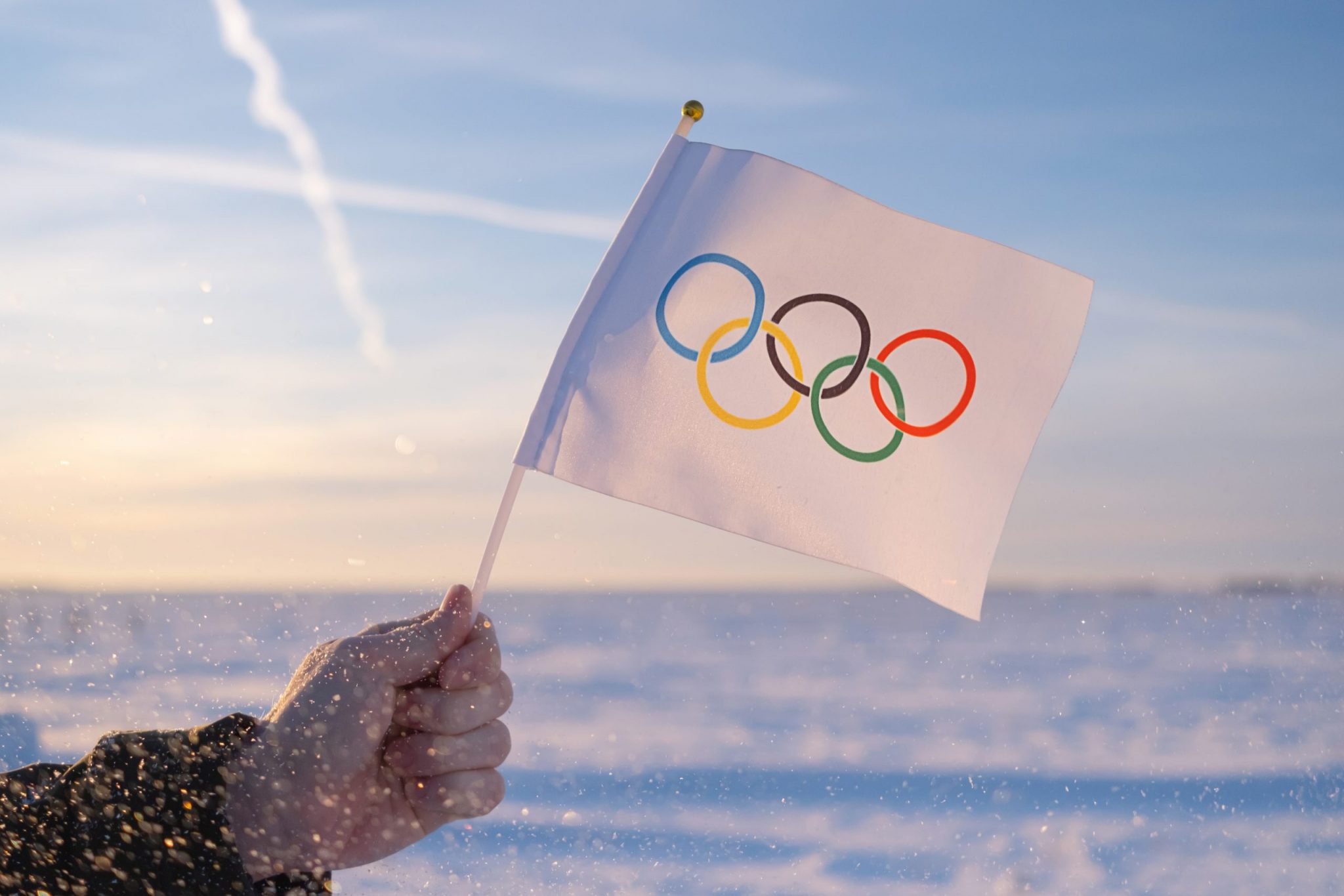Overview
Chinese diplomats and state media’s relentless promotion of the 2022 Beijing Winter Olympics between November 1, 2021 and February 1, 2022 highlights the crucial importance of the games for China. More than a sporting competition, Beijing sees the Olympics as a way to convince the world that its authoritarian model works. China’s effort to build its brand around the Olympics has come into conflict, however, with international criticism of China’s human rights abuses, represented most visibly by the U.S.-led diplomatic boycott of the games. Though dismissed by Chinese messengers as symbolic and a “flop,” the boycott is in fact a real setback for the Chinese government, as evidenced by the persistent efforts to slander the United States and praise China’s geopolitical supporters.
By the Numbers
Between November 1, 2021 and February 1, 2022, at least five of the most frequently used hashtags and key phrases in tweets by Chinese diplomats and state media were directly related to the games. During the studied period, roughly 6 percent of all tweets from monitored Chinese accounts mentioned the Olympics (14,432 mentions of Olympics in total), compared to .8 percent of all tweets from our control group of global media outlets (914 mentions of Olympics in total).
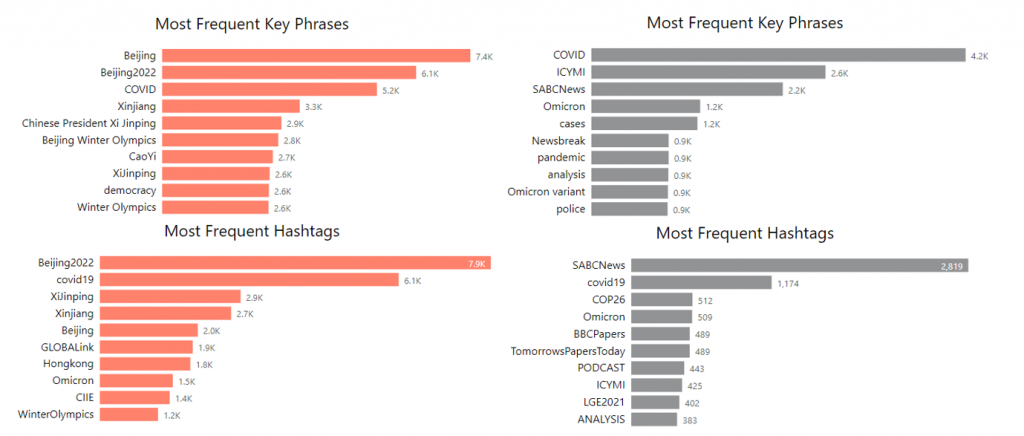
Key phrases and hashtags most frequently used by Chinese diplomats and state media (left) versus by global media outlets (right) on Twitter between November 1, 2021 and February 1, 2022.
By way of comparison, other topics that are mainstays of China’s messaging abroad, such as Xinjiang, Hong Kong, and the biggest story globally, COVID-19, only intermittently received more attention than the Olympics from Chinese diplomats and state media during the studied period. In January 2022, coverage related to the games dwarfed all other narratives in China’s messaging abroad.
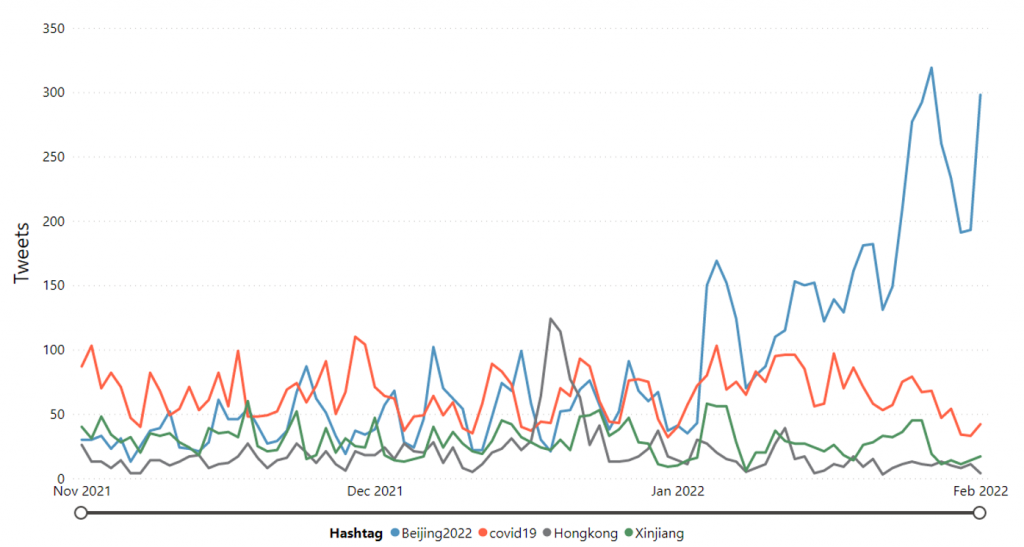
Use of #Beijing2022, #covid19, #HongKong, and #Xinjiang by Chinese diplomats and state media on Twitter between November 1, 2021 and February 1, 2022.
Given the significance of the games for the Chinese state, Chinese state media were particularly attentive to developments surrounding the U.S. diplomatic boycott. Between November 1, 2021 and February 1, 2022, Twitter accounts affiliated with Chinese state media outlets mentioned the key phrase “Olympic boycott” 42 percent more often than Russian state media accounts and 61 percent more often than our control group of global media accounts. The difference was even more stark when looking at diplomatic Twitter accounts. Chinese diplomatic Twitter accounts mentioned the Olympic boycott 221 times in the studied period, while Russian diplomats mentioned the boycott only six times. And besides China, the United States was far and away the most mentioned country in Olympic-related tweets from China’s messengers, registering nearly four times as many mentions as Russia, the third most mentioned country.
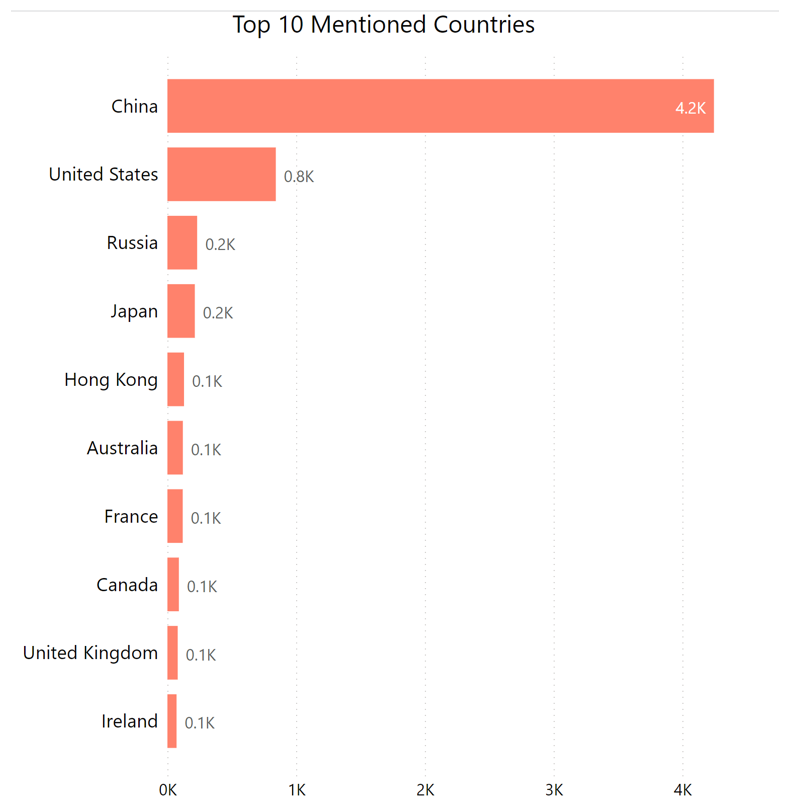
Most mentioned countries in Chinese state media and diplomatic tweets mentioning “Olympics” between November 1, 2021 and February 1, 2022.
What We’re Seeing on Hamilton 2.0
Chinese state-affiliated media primarily used the Olympics to promote the Chinese Communist Party’s governance and organizational prowess. A large part of their Olympics-related coverage showcased a modern country that is both innovative and mindful of the environment.
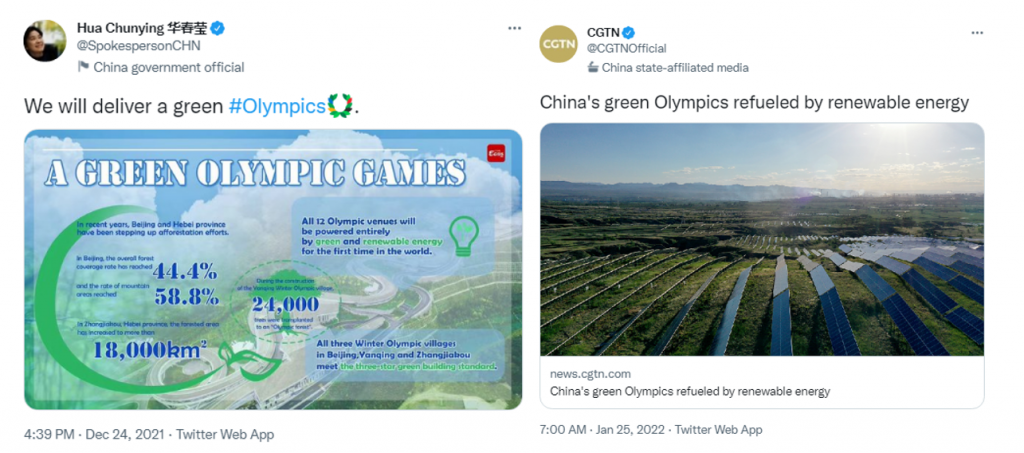
With China’s repressive policies in Xinjiang the driving factor behind Washington’s diplomatic boycott, Chinese diplomats and state media integrated Xinjiang into their Olympics promotion efforts, painting the province as a poster destination for China’s winter sports industry.
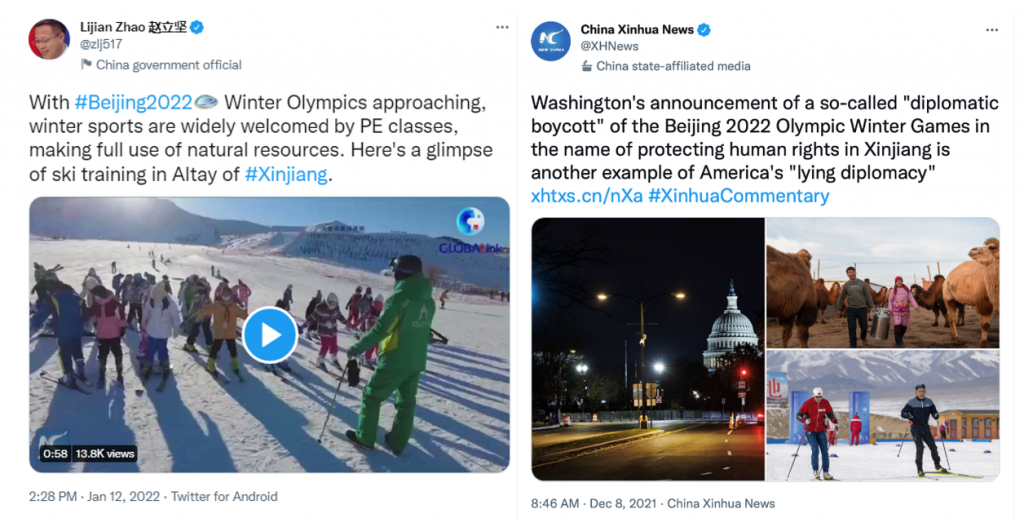
When the United States first announced the boycott, Chinese diplomats and state media’s initial reaction was to shrug it off as a geopolitical stunt. Countries that joined in the boycott were systematically denigrated and belittled.
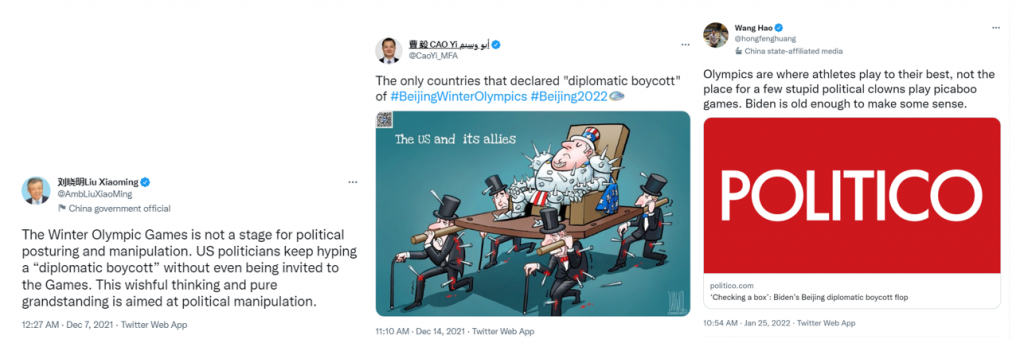
Conversely, Chinese diplomats and state media actively promoted statements by leaders who refused to endorse the boycott, and devoted significant coverage to foreign dignitaries who chose to attend the games.
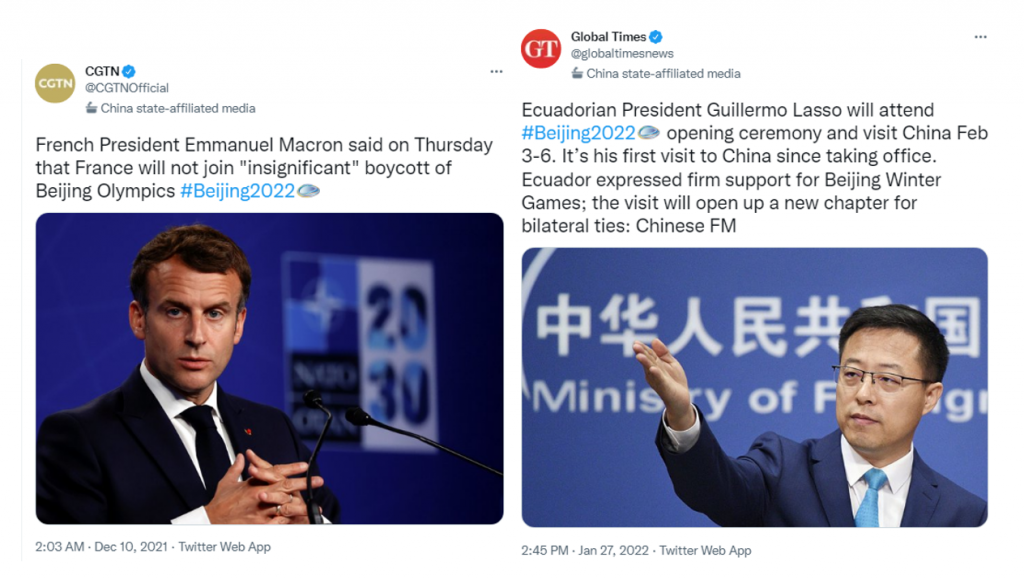
The Kremlin gave a boost to China’s promotion of the Winter Olympics when President Vladimir Putin announced that he would attend the games. The Kremlin’s official Twitter account also criticized the U.S. decision to boycott the Olympics, calling it “unacceptable” and “wrong,” a message that was echoed in a more conspiratorial tone by state media. For its part, China consistently hyped-up Russian athletes’ participation, conveniently omitting that Russia is banned from officially competing in international sporting events until 2023 because of its state-sponsored doping program.
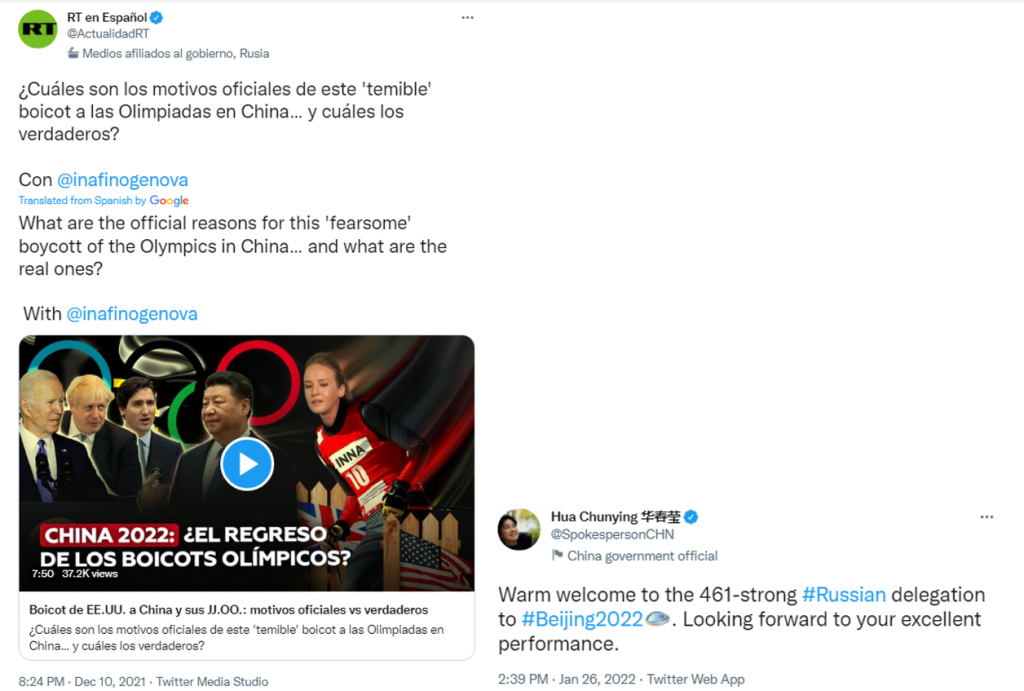
Why It Matters
Chinese diplomats and state media’s activism on Twitter is but a fraction of the Chinese campaign to promote the Winter Olympics abroad. In recent weeks, reports have surfaced exposing a Chinese-funded PR-campaign using Western influencers to promote China’s image during the games. In parallel to this public campaign, Beijing has been stalling a United Nations report on human rights abuse in Xinjiang to prevent its release before or during the Olympics. By actively promoting positive content related to the games while denigrating or suppressing any dissident voices, the Chinese state is continuing its broader effort to reinforce the global appeal of its authoritarian model.
The views expressed in GMF publications and commentary are the views of the author alone.

